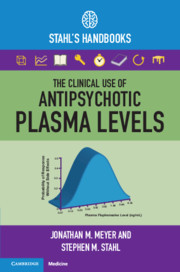The Clinical Use of Antipsychotic Plasma Levels Stahl's Handbooks Stahl's Essential Psychopharmacology Handbooks Series
Langue : Anglais
Auteurs : Meyer Jonathan M., Stahl Stephen M.

Clinicians recognize that monitoring psychotropic levels provides invaluable information to optimize therapy and track treatment adherence, but they lack formal training specifically focused on the use of plasma antipsychotic levels for these purposes. As new technologies emerge to rapidly provide these results, the opportunity to integrate this information into clinical care will grow. This practical handbook clarifies confusing concepts in the literature on use of antipsychotic levels, providing clear explanations for the logic underlying clinically relevant concepts such as the therapeutic threshold and the point of futility, and how these apply to individual antipsychotics. It offers accessible information on the expected correlation between dosages and trough levels, and also provides a clear explanation of how to use antipsychotic levels for monitoring oral antipsychotic adherence, and methods to help clinicians differentiate between poor adherence and variations in drug metabolism. An essential resource for psychiatrists, psychiatric nurse practitioners, and mental health professionals worldwide.
Preface; Introduction; 1. Sampling times for oral and long-acting injectable agents; 2. The therapeutic threshold and the point of futility; 3. Level interpretation including laboratory reporting issues, responding to high plasma levels, special situations (hepatic dysfunction, renal dysfunction and hemodialysis, bariatric surgery); 4. Tracking oral antipsychotic adherence; 5. What is an adequate antipsychotic trial – using plasma levels to optimize psychiatric response and tolerability; 6. Important concepts about first generation antipsychotics; 7. Haloperidol and haloperidol decanoate; 8. Fluphenazine and fluphenazine decanoate; 9. Perphenazine and perphenazine decanoate; 10. Zuclopenthixol and zuclopenthixol decanoate; flupenthixol and flupenthixol decanoate; 11. Chlorpromazine, loxapine, thiothixene, trifluoperazine; 12. Important concepts about second generation antipsychotics; 13. Clozapine; 14. Risperidone oral and long-acting injectable, paliperidone oral and long-acting injectable; 15. Olanzapine and olanzapine pamoate; 16. Aripiprazole, aripiprazole monohydrate and aripiprazole lauroxil; 17. Amisulpride, asenapine, lurasidone, brexpiprazole, cariprazine; Appendix Therapeutic threshold, point of futility, AGNP/ASCP laboratory alert level, and average oral concentration-dose relationships.
Jonathan M. Meyer is a Clinical Professor of Psychiatry at the University of California, San Diego, and a Psychopharmacology Consultant to the California Department of State Hospitals.
Stephen M. Stahl is Adjunct Professor of Psychiatry at the University of California, San Diego, Clinical Professor of Psychiatry and Neuroscience at the University of California, Riverside, and Honorary Visiting Senior Fellow in Psychiatry at the University of Cambridge.
Stephen M. Stahl is Adjunct Professor of Psychiatry at the University of California, San Diego, Clinical Professor of Psychiatry and Neuroscience at the University of California, Riverside, and Honorary Visiting Senior Fellow in Psychiatry at the University of Cambridge.
Date de parution : 09-2021
Ouvrage de 400 p.
12.5x18.6 cm
Disponible chez l'éditeur (délai d'approvisionnement : 14 jours).
Prix indicatif 52,22 €
Ajouter au panierThème de The Clinical Use of Antipsychotic Plasma Levels :
© 2024 LAVOISIER S.A.S.



